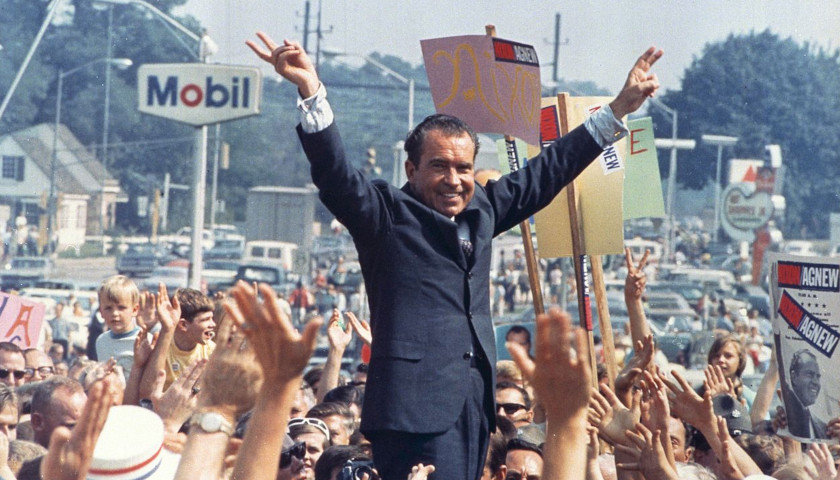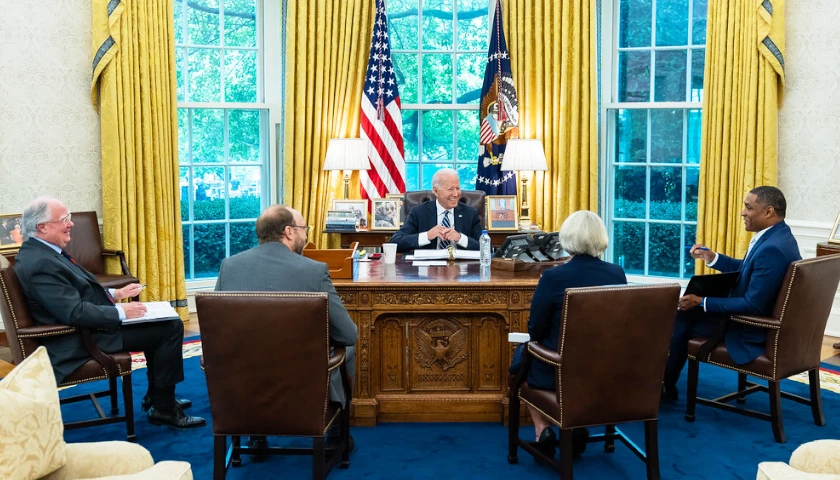by Ken Masugi
The best book on Special Counsel Robert Mueller’s report—and one that few people have actually seen—came out in January. In fact, the most relevant chapter was published originally in 1992, in an academic journal, and that article was based on a conference paper delivered in 1984.
The book is John Marini’s Unmasking the Administrative State, which I helped to compile. The chapter to which I refer is “Politics, Rhetoric, and Legitimacy: The Role of Bureaucracy in the Watergate Affair.” Marini updated the original article with a short afterword reflecting on President Trump’s struggle with the bureaucracy—which, as it happens, does not mention Mueller’s efforts or anything about Russian collusion or the other subjects of the report.
Yet Marini’s work will remain for some time the best source for understanding the report’s significance. He makes clear the mere appointment of the special counsel meant that the bureaucracy had won and that Trump’s presidency would be crippled not merely for the tenure of the counsel but even for its duration. With that appointment, the greatest promise of Trump’s presidency was over immediately after it got started, with more allegations to come.
Marini observes that all political scandals are now seen through the lens of the Watergate affair, now nearly 50 years old. But his interpretation of Watergate, and of much else in American politics, stands conventional wisdom on its head.
In Marini’s telling (my summary necessarily lacks the subtlety of his rendition), Richard Nixon—that synonym of infamy, the criminal of all political criminals—becomes the unacknowledged defender of the constitutional order; of the separation of powers and limited government.
“In the broadest sense,” Marini writes, “the issues of Watergate involved the question of legitimacy concerning the use of power in national politics.”
Lyndon Johnson’s Great Society legislation touched all aspects of economic and social life and transformed the lives of Americans, but in giving overwhelming power to a growing, unelected bureaucracy in Washington, it also assailed American constitutional principles of separation of powers and federalism and, moreover, rule by consent of the governed. Barring crises, “administrative rule replaces political rule”—rational bureaucratic expertise replaced elected representatives, amateurs representing their constituents and seeking compromise to reach a common good.
In 1972, Nixon won the most overwhelming victory to date in any presidential election over liberal Democrat George McGovern. As his Secretary of State Henry Kissinger would later put it, the “American people for once had chosen on philosophical grounds, not on personality,” though, Marini acknowledges, Nixon did not campaign on how he would restore power to the majority, silent or otherwise.
Nixon was, however, stubborn in denying the political neutrality of the bureaucracy. This in turn meant “an implicit repudiation of the Progressive view legitimated by the New Deal and made operative in the Great Society, that government could be an ‘engine of compassion.’”
At the heart of Nixon’s “New American Revolution” was the restoration of representative government, through devolution of power to the states and a reorganization of the executive branch. The bureaucracy, in brief, is what Nixon proposed would “alienate . . . nearly every center of power in American life.” The Democrats controlled the House of Representatives (as they would until 1994) and the Senate—and the bureaucracy, not to mention the media and the universities.
Nixon hoped his “administrative presidency” would “break the Eastern stranglehold on the executive branch and the federal government.” In his memoirs, Nixon saw his enemies as holding four aces—“the Congress, the bureaucracy, the majority of the media, and the formidable group of lawyers and power brokers who operate behind the scenes in the city. It was another thing to give them the fifth ace of a timid opposition party.” This is as succinct a description of the administrative state as possible. And the administrative state, aided by its partisan allies, destroyed him.
In reflecting on his earlier Watergate essay, Marini notes the continuing triumphs of the administrative state, despite Ronald Reagan’s declaration that “government is the problem.” Bureaucracy continues to replace politics—review the history of the Affordable Care Act—and note how “the political rule of law gives way to executive and administrative discretion.”
Marini notes the further aggressiveness of central authority today: “The growth of the administrative state has made it possible to politicize the culture by undermining the institutions of civil society, including the family, church, and nearly all private associations . . . . The various nationally organized interests, whether political, economic, social, media, entertainment, educational, scientific, cultural, or religious, have accommodated themselves to centralized rule.”
Marini goes on to raise the question, “What did Watergate reveal?” The source of the leaks that led to the removal of the legitimately elected president was not known until years later.
“It was not surprising,” he relates, “that Deep Throat, the source for Bob Woodward and Carl Bernstein, turned out to be a high-level official of the Federal Bureau of Investigation . . . Mark Felt . . . leaked that information to the Washington Post over the course of a year or more. It served to delegitimize the president and alienate him from the electorate and his party. Although Woodward and Bernstein were lauded as investigative reporters, they served merely as a conduit by which the bureaucracy could undermine the authority of an elected officeholder.”
If all of this sounds familiar to anyone paying attention to Trump and his friends and enemies, it is because Mueller is a rerun. The FBI continues today to act in defense of the administrative state. For more, on how Trump differs from Nixon and compromised Republican presidents, I point out to interested readers that Marini’s book contains two chapters on the Trump campaign and his presidency.
– – –
Ken Masugi, Ph.D., is a senior fellow of the Claremont Institute. He has been a speechwriter for two cabinet members, as well as for Clarence Thomas when he was chairman of the Equal Employment Opportunity Commission. Masugi is a co-author, editor, or co-editor of seven books on American politics. He has taught at the U.S. Air Force Academy, where he was Olin Distinguished Visiting Professor; James Madison College of Michigan State University; the Ashbrook Center of Ashland University; and Princeton University.





